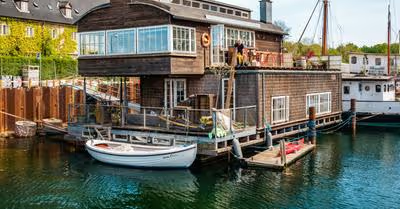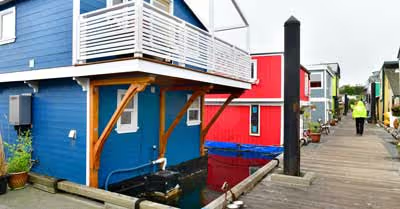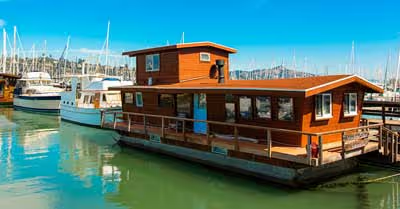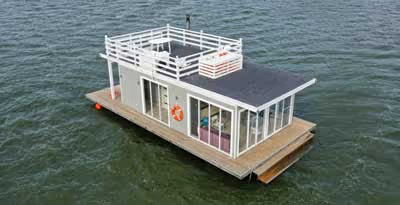
Houseboat insurance is well worth the price, and it’s typically less costly than auto and homeowners insurance.
The average cost of houseboat insurance is around $1,200 per year or $100 per month. Prices vary from $600 to $2,000 annually, with factors such as location, boat value, and your driving record having an effect.
In this article, we’ll cover the average cost of houseboat insurance in the United States for both new and used vessels. We’ll cover popular policy options, additional costs, restrictions, and how to lower your insurance premiums.
We sourced the information used in this article from insurance companies and coverage pricing guides. We also analyzed self-reported insurance costs in the houseboat community.
Average Cost of Houseboat Insurance
Houseboat insurance prices vary. Usually, they amount to an expense similar to car insurance, which is still less expensive than many kinds of homeowner’s insurance. For a typical individual, an insurance policy on a late-model houseboat is likely to cost between $600 and $2,000 per year or between around $50 and $160 per month.
All things considered, even the best houseboat insurance policies are a fairly affordable expense. Unlike many auto insurance policies, houseboat insurance often combines both protection of the vessel and of the assets you have inside. But to get the best insurance rates, there’s a chance you’ll need to have an approved insurance inspection (called a marine survey) completed.
Marine Surveys and Houseboat Insurance
As is common in the boat insurance industry, there’s a chance you’ll need a marine survey to get the best price on your policy. A marine survey is the nautical equivalent of a vehicle inspection. Insurance companies use these inspections to analyze the risk of insuring your vessel.
So, what factors determine if you get coverage and how much it costs? The marine survey has a lot to do with it. The better shape your boat is in, the better chance you have of getting reasonable coverage. But if your boat is falling apart or suffering from serious issues, you may not get a policy at all.
Another purpose of the marine survey is to determine the value of your boat. It’s kind of like getting a house appraised. This gives the insurance company an idea of how much coverage you need, as houseboat prices aren’t as easy to quantify as car prices. Also, the houseboat market is limited, so it takes an expert opinion to gauge the real insurable value of the vessel.
Who Can Complete a Marine Survey?
It depends on the insurance company and the true purpose of the survey. If the insurance company requests a survey, it’s essential to find a surveyor who is approved by the insurer. This process can be confusing, as there are other types of boat surveys that can be performed by boatyard workers or anyone else for that matter.
Sometimes, you may need to haul out your houseboat to get an approved survey. This is not often the case with newer production boats. Instead, older vessels made of materials other than fiberglass are more likely to need hauling out.
Factors that Affect Houseboat Insurance Prices
The most important houseboat insurance cost factor is the price and value of the boat. A houseboat worth $20,000 will certainly be cheaper to insure than a brand new houseboat worth $250,000. This is the case regardless of where you go in the country.
On that note, your location also plays a part. Insurance companies look at numerous risk factors, including accident rates in your location and the weather. For example, you’re likely going to pay more for insurance in an area with frequent severe storms and large hail than you would elsewhere. Places prone to tropical storms, such as Florida, also have higher rates.
Additionally, houseboats used in freshwater are usually cheaper to insure than those used in saltwater. Rates during the summer are typically lower than the winter, and proof of proper winterization can lower premiums during the off-season.
Your personal history plays a part, too, just like it does with auto insurance. A boat owner with a clean record, few claims, and no recent accidents will be offered better rates than someone with DUIs and boat driving accidents on their record.
Houseboat Insurance Coverage Restrictions
Some restrictions exist for houseboat insurance, though it varies between companies. For example, some insurance companies offer different rates for liveaboards, as using the boat for a residence requires a more comprehensive policy and a higher price.
Other companies flat-out won’t cover liveaboards, as they deem the risk too high or they haven’t figured out a way to accurately gauge costs. Thankfully, most companies will cover liveaboards—albeit at slightly modified rates.
Additionally, some insurance companies impose coverage limits and cap the value of vessels they’re willing to insure. Given the risks involved, some companies refuse to cover vessels worth more than $200,000 or $250,000. But why an arbitrary value? After all, there are a ton of new houseboats that sell for $200k or more.
This is because a houseboat can be a total loss (like an automobile), and a payout in the hundreds of thousands is an insurance adjuster’s worst nightmare. This is despite the fact that houseboats almost never sink (compared to sailboats and speedboats), and total-loss events are relatively rare.
What Does Houseboat Insurance Cover?
Houseboat insurance covers a number of things, depending on the policy and coverage amounts. The least expensive kind of houseboat insurance is basic liability. This form of coverage protects other people from you if you should cause an accident, but it doesn’t cover the cost to repair or replace your vessel and its contents.
Most houseboat owners purchase more than just basic liability. A more popular option is full vehicle coverage, which usually covers accidents you cause and accidents other people cause to you. This often includes coverage against an ‘Act of God’ like a hailstorm or hurricane. Next, we’ll cover some more boat-specific options that continue to be popular.
Personal Effects Coverage
Houseboats often contain expensive home items such as furniture, computers, and appliances. As a result, insurance companies offer policies that cover all of the items inside the boat as well. Of course, you’ll pay a premium price for it, but it’s often worth it relative to the total cost of insurance.
Repair Coverage
Boat insurance companies also offer repair coverage. This is especially true for newer boats which are less likely to break down. Boat repairs can come suddenly and cost a lot of money, so many people choose to add extra coverage to ensure speedy and prompt repairs.
Towing
Insurance companies such as BoatUS are famous for offering towing and recovery services to their members. If you get underway often, towing coverage is an absolute must. Boat towing is expensive, and vessels break down all the time, so having your tow covered can save you headaches and financial turmoil.
How to Lower Insurance Costs
There are numerous ways to lower your boat insurance costs. The fastest is to get a boater’s license or complete a boating safety course, even if your state doesn’t require you to have one. This is similar to taking defensive driving courses, but it usually costs less and only requires a written exam.
Get a survey done if you haven’t already. If you have a safe boating record, keep driving safe—and if you don’t, avoid getting citations or engaging in risky behavior on the water. You can also raise your hull deductible, which increases out-of-pocket costs in an accident but can quickly lower your rates.










